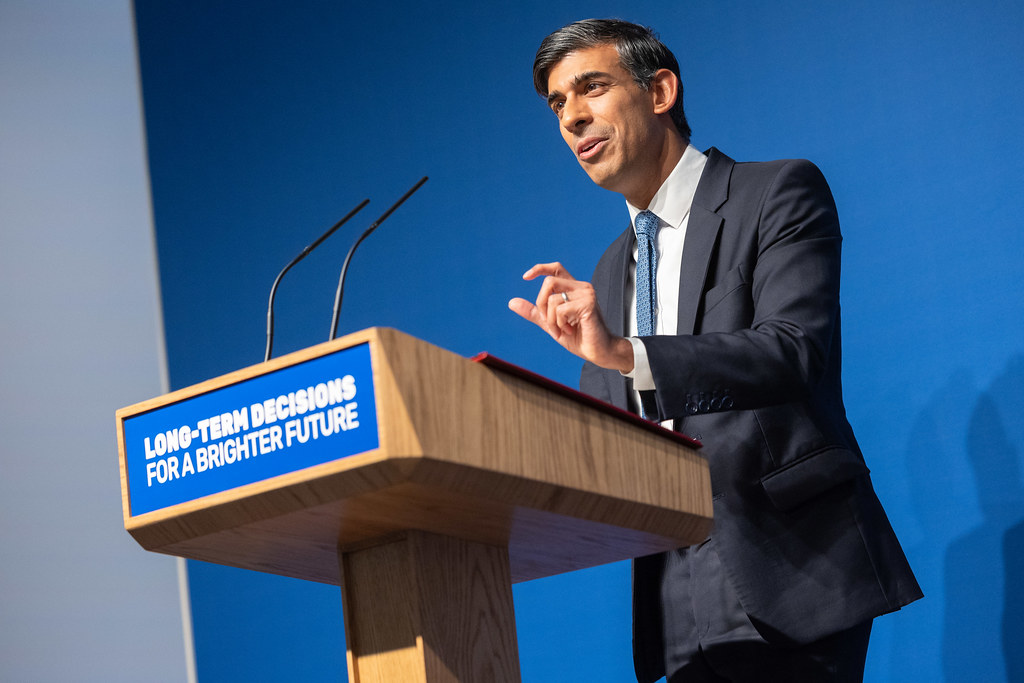Former Prime Minister Liz Truss demanded Sunak “reconsider” China’s invite to the UK’s summit on artificial intelligence…reports Asian Lite News
The government has published a new report into the capabilities and risks from frontier Artificial Intelligence (AI), ahead of Prime Minister Rishi Sunak’s speech on the global responsibility to address the risks head on and make the most of the opportunities.
One of the key objectives of the AI Safety Summit – the first-ever global summit to discuss AI safety – is to come to a shared understanding of the emerging risks, which can then inform how nations manage them. It also highlights the need for countries around the world to understand the pitfalls presented by frontier AI to unlock its enormous benefits, the British High Commission said.
The publication will serve as a discussion paper at next week’s summit. It forms part of the government’s action to take long-term decisions for a brighter future, leading the way globally on AI safety.
This is in the long-term interest of the country to understand and grip the risks of AI in order to seize the enormous opportunities it brings to improve people’s lives, public services and economic growth and productivity.
The publication comes ahead of the speech by Sunak on AI. He will set out how the government will do what is right to make AI safe, cement the UK as a global leader in AI safety, and ensure Britain can harness its benefits to build a better future for generations to come.
During his speech, PM Sunak is expected to speak on the new opportunities generated by Artificial Intelligence, and at the same time address the new fears created by it.
Truss urges Sunak to ‘reconsider’ China’s invite
Meanwhile, former Prime Minister Liz Truss demanded Sunak “reconsider” China’s invite to the UK’s summit on artificial intelligence.
Truss said she was “deeply disturbed” that representatives from the Chinese government have been asked to attend. “The regime in Beijing has a fundamentally different attitude to the West about AI, seeing it as a means of state control and a tool for national security,” Truss warned in a letter also published on X, formerly Twitter.
The intervention from Truss comes hours after Sunak — who replaced her in No.10 Downing Street after an eventful and short stint in office last year — confirmed that China had been invited to the summit, saying it was the right thing to do.
“There can be no serious strategy for AI without at least trying to engage all of the world’s leading AI powers,” Sunak said.
Chinese officials have been invited to attend both days of the summit, though will not be invited to a meeting on the safety and security risks from AI on the gathering’s second day.
But in her letter to the prime minister, Truss said, “no reasonable person expects China to abide by anything agreed to at this kind of summit.”
Pressed on Truss’ comments Thursday evening, Sunak’s spokesperson told reporters: “There’s no change in our position … The approach that we’re taking is in line with the clear-eyed approach that we do with China.”
And they added of Beijing: “It’s right to try and engage and get them to be part of that conversation.”
Alarming scenarios
The document also outlines a number of alarming scenarios for the development of AI.
One warns of a public backlash against the technology led by workers whose jobs have been affected by AI systems taking their work. “AI systems are deemed technically safe by many users … but they are nevertheless causing impacts like increased unemployment and poverty,” says the paper, creating a “fierce public debate about the future of education and work”.
In another scenario, dubbed the “wild west”, misuse of AI to perpetrate scams and fraud causes social unrest as many people fall victim to organised crime, businesses have trade secrets stolen on a large scale and the internet becomes increasingly polluted with AI-generated content.
One other scenario depicts the creation of a human-level artificial general intelligence that passes agreed checks but triggers fears it could bypass safety systems.
The documents also refer to experts warning of the risk that the existential question draws attention “away from more immediate and certain risks”.
A discussion paper to be circulated among the 100 attendees at the summit outlines a number of these risks. It states the current wave of innovation in AI will “fundamentally alter the way we live” and could also produce breakthroughs in fields including treating cancer, discovering new drugs and making transport greener.
However, it outlines areas of concern to be discussed at the meeting including the possibility for AI tools to produce “hyper-targeted” disinformation at an unprecedented scale and level of sophistication.
“This could lead to ‘personalised’ disinformation, where bespoke messages are targeted at individuals rather than larger groups and are therefore more persuasive,” says the discussion document, which warns of the potential for a reduction in public trust in true information and in civic processes such as elections.
“Frontier AI can be misused to deliberately spread false information to create disruption, persuade people on political issues, or cause other forms of harm or damage,” it says.

